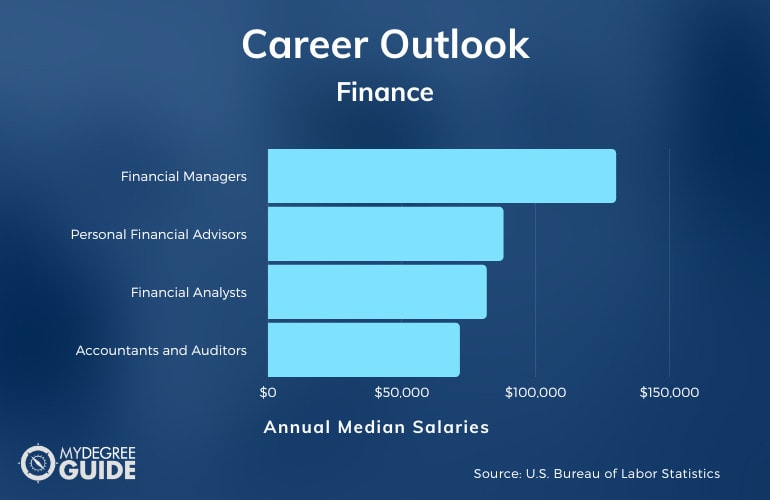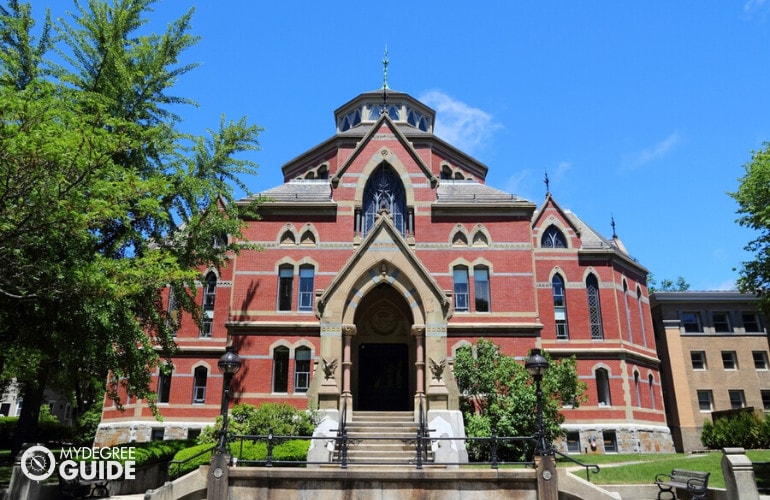Looking for Online Masters in Finance Programs for 2024? Compare schools and explore programs. No GMAT or GRE required!

If you are interested in the intriguing field of finance and are too busy to attend traditional classes, an online master’s in finance may be perfect for you.
Editorial Listing ShortCode:
Most individuals who pursue online finance degrees are fascinated with the finance sector and eager to learn more or are already working in the field and desire to advance in their career.
List of Universities Offering Online Masters in Finance No GMAT Programs
Each of these universities offers online master’s programs in finance and either does not require GMAT scores or offer waivers for qualifying candidates. They are also duly accredited.
1. American University
Founded by Methodist bishop John Fletcher Hurst, American University is located in Washington, D.C. It was chartered by Congress in 1893 in response to the call of former President George Washington to create a national university in the capital of the United States.
This Methodist-affiliated school has a diverse student body. Aside from the United States, more than 140 countries are represented in the school’s student body. More than 13% of its undergraduates come from other countries. According to US News and World Report, it is one of the best national university in the country.
- MBA – Finance
AU is accredited by the Middle States Association of Colleges and Secondary Schools.
2. Bentley University
A private university located in Waltham, Massachusetts, Bentley University was founded as a school of accounting and finance in 1917. It was first located in Boston, MA before moving to Waltham in 1968. Three years later, it was renamed Bentley College.
The Bentley Falcons compete in the NCAA Division II save for the men’s hockey team, which is part of Division I. It is included in the list of the Best 386 Colleges by the Princeton Review. It ranked first in the nation for the Best Career Services category.
- Masters in Finance
Bentley is accredited by the New England Association of Schools and Colleges, Inc.
3. Colorado State University
Based in Fort Collins and established 1870, Colorado State University is the public flagship of the Colorado University system. They have over 33,000 students, including both full-time residents and part-time students. They also serve 5,000 long-distance and online students.
Originally, the school was established as an Agricultural College, but their programs now encompass the liberal arts, STEM-based research, technology, and the Arts, as well as a prestigious medical school. Colorado State University also has a successful sports league, as they play in Division I of the NCAA. Among their famous alumni, it is easy to find the names of Pulitzer prize winners, astronauts, and Fortune 500 CEOs.
- Masters in Finance
CSU is regionally accredited by The Higher Learning Commission.
4. Golden Gate University
Founded in 1901, Golden Gate University is a private school located in San Francisco, California. Initially called YMCA Evening College, it was renamed the Golden Gate College in 1923. In 1972, it was elevated to university status.
While the main campus is located in the financial district of San Francisco, there are also other satellite learning sites in Los Angeles, Seattle, and the Silicon Valley. US News and World Report ranked the university’s bachelor’s online program as among the top 100 in the world. It was also named the top college for adult learners by Washington Monthly.
- Masters in Finance – General
- Masters in Finance – Corporate
- Masters in Finance – Investment Management
GGU is accredited by the Western Association of Schools and Colleges.
5. Indiana University
Indiana University is a fully-established Public University system that offers campuses and outreach programs across the state of Indiana. They date back to 1820.
They currently serve over 100,000 students across the state, although these are divided among its 2 core campuses (Bloomington and Indianapolis) and its 7 additional regional branches. The Bloomington campus is the largest one, and it is considered one of the “Public Ivy” universities. They offer students their own internal transport system and are renowned across the state for their sustainability programs.
- Masters in Finance
IU is accredited by The Higher Learning Commission.
6. Liberty University
One of the largest Christian universities in the world, Liberty University has its main campus in Lynchburg, Virginia.
Its campus had more than 15,000 students as of 2017, while its online courses had nearly 95,000 enrollees. This private evangelical Christian university has 17 colleges. Its athletic teams are called the Liberty Flames, competing in the NCAA Division I.
The school is also known for its honor code called, “Liberty Way,” which prohibits members of the opposite sex from interacting with each together and engaging in premarital sex.
- Masters in Finance – Financial Management
- Masters in Finance – Financial Planning
- Masters in Finance – General
Liberty is accredited by the Southern Association of Colleges and Schools Commission on Colleges.
7. New England College of Business
This school was originally founded in 1909 as the American Banking Institute. In 1914, it was incorporated by the Commonwealth of Massachusetts. In 1979, it was accredited by the Board of Regents of Higher Education to offer associate degree in business administration.
Ten years later, it was fully accredited by the New England Association of Schools and College. It was the first bank-supported educational institution in the USA to have been accredited as a degree-granting college.
- Masters in Finance – Ethics and Corporate Social Responsibility
- Masters in Finance – Global Finance Trading
- Masters in Finance – Healthcare Management
- Masters in Finance – Leadership
NECB is accredited by the New England Association of Schools and Colleges.
8. Northeastern University
Northeastern University was established in 1898. It is a private research university offering undergraduate and graduate programs in its Boston campus. It also has satellite campuses in other parts of the US, such as Charlotte, N.C.; Seattle, WA; San Jose, CA, as well as in Canada (Toronto).
There are also plans to put up a satellite campus in Vancouver. It has around 18,00 undergraduate students and 8,000 graduate students. Its athletic teams are called the Northeastern Huskies. Competing in the NCAA Division I, the school has teams in 18 varsity sports. It excels in sports such as track and field, basketball, men’s soccer, and men’s hockey.
- Masters in Finance
Northeastern is regionally accredited by the New England Association of Schools and Colleges, Inc.
9. Pace University
This private university was established in 1906 as a business school by brothers Homer and Charles Pace. Its main campus is in New York City with a secondary campus in Westchester County. It has more than 13,000 students, including those enrolled in doctoral programs.
The athletic teams of the university are nicknamed the Setters. The name of the mascot is the Setter. It has 14 varsity sports teams, competing basketball, football, baseball, soccer, and swimming. It is affiliated with the NCAA Division II and Northeast 10 Conference.
- MS in Finance
Pace is accredited by the Middle States Commission on Higher Education.
10. Southern New Hampshire University
Southern New Hampshire University (SNHU) is a private university with more than 93,000 students. Founded in 1932, it emerged as one of the fastest-growing universities in the United States.
It was listed as one of the Best Regional Universities by U.S. News & World Report and was named as one of the Most Innovative Companies by Fast Company. It was also awarded by The United States Distance Learning Association for its distance learning program.
- Masters in Accounting Finance
- Masters in Finance – Corporate Finance
- Masters in Finance – Investments & Securities
- MBA – Finance
SNHU is accredited by the New England Commission of Higher Education (NECHE).
11. Strayer University
Strayer University is a private university founded in 1892. Originally known as Strayer’s Business College, it was elevated into university status in 1998. It has more than 50,000 students enrolled in its online programs, with more than 70 campuses located across the United States.
It has headquarters in Washington, D.C. with campus locations in the eastern and southern parts of the country, including Maryland, North Carolina, Virginia, South Carolina, Florida, Pennsylvania, Tennessee, Georgia, and Delaware.
Strayer University was founded by Dr. Siebert Irving Strayer in Baltimore, Maryland. The college was first conceptualized to teach business skills, such as typing and accounting, to former farm workers.
- MBA – Finance
Strayer is institutionally accredited by the Middle States Commission on Higher Education, which is recognized by the U.S. Department of Education and the Council for Higher Education.
12. Thomas Edison State University
Thomas Edison University (TESU) is a Trenton, New Jersey-based public university established on July 1, 1972. It was named after the popular inventor who spent most of his adult life in New Jersey. It was elevated to university status in 2015.
The school’s campus in Trenton, New Jersey is composed of seven buildings. The school moved there in 1979, establishing its headquarters in the centuries-old Kelsey Building, which is one of the architectural landmarks in the city. However, since all its students are enrolled online, only a handful of them even get to see their school’s headquarters.
- MBA – Finance
TESU is accredited by the Middle States Commission on Higher Education.
13. University of Arizona
The University of Arizona is a public research university based in Tucson, AZ. It holds the distinction of being the first university in the Arizona Territory, having been founded in 1885. It has more than 45,000 students in 19 colleges.
It is one of the most awarded public universities for research by NASA. It was once awarded more than $325 million for its Lunar and Planetary Laboratory to lead the 2007-08 mission to Mars. Its athletic teams are nicknamed the Arizona Wildcats and participate in the Pac-12 Conference of the NCAA. Its athletes have won national titles in men’s basketball, softball, and baseball.
- MBA – Finance
UA is accredited by the Higher Learning Commission.
14. University of Dallas
A private Catholic university in Irving, Texas, the University of Dallas was established in 1957. It is considered one of the top universities for Catholic orthodoxy (Wikipedia). Today, it has more than 3,000 students.
The University of Dallas was once named by the Princeton Review as one of the best western colleges. It also made it to the Forbes list of the best colleges in America. Its athletic teams are nicknamed the “Crusaders” and participate in the NCAA Division III.
- Masters in Finance
U Dallas is accredited by the Southern Association of Colleges and Schools Commission on Colleges (SACSCOC).
15. University of Hartford
The University of Hartford is a private university based in West Hartford, Connecticut. It was established in 1957 when it was joined with the Hillyer College, Hartford Art School, and The Hartt School.
It has students from 48 states and 43 countries. It has been a lead institution for the Connecticut Space Grant College Consortium since 1988. In the 90s, it bought out the Hartford College for Women as part of its commitment to women’s education.
In 2003, the said college was closed down, and its degree programs were transferred to its College of Arts and Sciences. It has two magnet schools serving students from surrounding suburbs—the University of Hartford Magnet School and the University High School of Science and Engineering.
- MBA – Finance
Last reaffirmed in May 2012, the University of Hartford is regionally accredited by the Commission on Institutions of Higher Education (CIHE) for the New England Association of Schools and Colleges (NEASC).
16. University of Massachusetts – Amherst
This public research university is the flagship campus of the University of Massachusetts system. It is based in Amherst, Massachusetts with an annual enrollment of more than 30,000 students. It was founded in 1863 under the Federal Morrill Land Grant Colleges Act. It was initially called the Massachusetts Agricultural College.
In 1931, it was renamed Massachusetts State College in recognition of broader curriculum and higher enrollment. In 1947, it was renamed the University of Massachusetts. In 2003, it was designated as the flagship campus of the University of Massachusetts system. Its sports teams are nicknamed the Minutemen and Minutewomen. They participate in the NCAA Division I.
- MBA – Finance
UMass Amherst is accredited by the New England Commission of Higher Education.
17. University of Massachusetts – Lowell
The University of Massachusetts – Lowell is the largest university in the Merrimack Valley with more than 18,000 students. Part of the University of Massachusetts system, it is also the second biggest public institution in the state.
It is also one of the few public universities in the US to offer undergraduate degrees in plastics engineering, nuclear engineering, meteorology, and sound recording technology. It is organized into six colleges and schools. Its sports teams are nicknamed the River Hawks and compete in the NCAA Division I.
- Masters in Finance
- MBA – Finance
UMass Lowell is accredited by the New England Association of Schools and Colleges (NEASC) and has been continuously since 1975.
18. University of Miami
The University of Miami is a private research university based in Coral Gables, Florida. It has more than 17,000 students enrolled in 12 separate schools and colleges, including a law school and a school of medicine.
The school’s history began in 1925 when real estate developer George Merrick contributed a 160-acre property for the establishment of a coeducational institution. It was chartered on April 8, 1925. It is consistently rated as one of the best colleges in America. In the Best National University Rankings list of US News and World Report, it was ranked 49th.
The athletic teams of the school are nicknamed the Hurricanes, competing in the NCAA Division I.
- MS in Finance
UM is accredited by the Commission on Colleges of the Southern Association of Colleges and Schools.
19. University of North Carolina – Chapel Hill
The University of North Carolina at Chapel Hill is the public flagship of the University of Carolina system, which encompasses 17 different campuses. They were originally established in 1789, which makes them one of the oldest public universities in the country and the first one in the state of North Carolina.
Their main campus is located in the city of Chapel Hill, a university town in the middle of the state. Although originally devoted to the liberal arts, it now has significant research activity and is part of the Research Triangle of the Southern East Coast.
- MBA – Finance
UNC is accredited by the Southern Association of Colleges and Schools Commission on Colleges.
20. University of Oklahoma
The University of Oklahoma is a public research university founded in 1890 and based in Norman, Oklahoma. It has more than 30,000 students mostly at its main campus.
It is classified as a doctoral university with very high research activity. Two prominent museums are hosted on its Norman campus, the Fred Jones Jr. Museum of Art and the Sam Noble Oklahoma Museum of National History. Its sports teams are called the Sooners, in reference to early settlers in the state. The teams participate in the Big 12 Conference and NCAA Division I-Bowl Division.
Its football program is considered the most famous and storied, having produced a number of Heisman trophy winners. Aside from football, it has also won championships in baseball and softball.
- Masters in Finance
OU is accredited by the Higher Learning Commission.
21. University of Scranton
The University of Scranton is a private, Catholic Jesuit research university in Scranton, Pennsylvania. Founded in 1888 by the first bishop of Scranton, William O’Hara, it was first known as the St. Thomas College. It was elevated to university status in 1938 and renamed The University of Scranton.
It has more than 6,000 students with most of them coming from Pennsylvania and nearby areas of New York and New Jersey. Its athletic teams are called the Royals and compete in the NCAA Division I.
- Masters in Finance
The University of Scranton is accredited by the Middle States Commission on Higher Education (MSCHE).
22. University of Wisconsin – Whitewater
A public university in Whitewater, Wisconsin, the University of Wisconsin has more than 12,000 students. It was established in 1868 as the Whitewater Normal School. In 1927, it was renamed Whitewater Teachers College. In 1951, it was renamed Wisconsin State College-Whitewater. In 1971, it became part of the University of Wisconsin System and renamed University of Wisconsin – Whitewater.
Its sports teams are called the Whitewater Warhawks and compete in the NCAA Division III. In 2013-14, the university made college sports history after becoming the first school to have won the championships in men’s basketball, football, and baseball.
- Masters in Finance
UWW is accredited by the Higher Learning Commission.
23. Walden University
Established in 1970, Walden University is a private university that focuses mainly on online and long-distance programs. They place a special emphasis on Business education at a master’s level.
As they deal primarily with long-distance learning, they do not have a traditional campus, although they do have academic and administrative offices in the city of Minneapolis. It is estimated that they currently have 49,000 students. It is a member of the Laureate Education, Inc. commercial group.
- Masters in Finance
Walden is accredited by The Higher Learning Commission.
24. Walsh College
Walsh College offers a Master of Science in Finance that can be earned in a 100% online program with a synchronous format. Classes are small and taught by faculty members with real-world experience.
The curriculum emphasizes hands-on learning and knowledge of the latest software and technology. Prospective students may apply year-round. The school’s calendar consists of four semesters that are each 11 weeks long, and accepted students may start during any of these.
- Masters in Finance
Walsh is accredited by the Higher Learning Commission.
25. William & Mary
William & Mary’s Raymond A. Mason School of Business is a renowned institution known for its excellence in business education. Located in Williamsburg, Virginia, it offers a diverse range of programs, including MBA and specialized master’s degree programs.
The school is committed to fostering innovation, leadership, and ethical business practices. Its online Master of Science in Finance (MSF) program offers a comprehensive financial education designed to teach essential skills and knowledge for financial professionals.
With classes designed to fit the schedules of working professionals, the program is delivered over a span of 16 months.
- Masters in Finance
William & Mary is accredited by the Southern Association of Colleges and Schools Commission on Colleges.
Masters in Finance Programs
There are a variety of concentrations offered to students pursuing a master’s degree in finance. You can choose to specialize in a certain topic depending on your interests, passions, and desires for your future career in the financial industry.
- Asset Management: Learn the ropes of working with clients and big businesses that plan to invest lots of money. Courses for this concentration focus on how to look at financial portfolios for companies and individuals.
- Computation and Programming: Learn how to manage the technical tasks that experts use to research and find data. The courses you take can teach you how to form essential financial services.
- Computational Finance and Trading Systems: Learn the science of finance and how to trade assets. You can study how to examine the trading systems as well as what kind of incidents can benefit and damage the market.
- Computation and Programming: Learn how to manage the technical tasks that experts use to research and find data. The courses you take can teach you how to form essential financial services.
- Computational Finance and Trading Systems: Learn the science of finance and how to trade assets. You can study how to examine the trading systems as well as what kind of incidents can benefit and damage the market.
- Derivatives: Learn about derivatives, which secure finances by looking at the assets. The courses under this concentration go over important segments of the finance field; examples of the areas that can be taught are how to manage risks, various theories, and how experts determine their assets.
- Finance and Economics: Learn economics and how it impacts the field of finance. You can study finances related to the corporate world as well as the economy and how the state of an economy can determine a company’s success financially. You can also choose to take a generalized Finance program to gain an overview of the field.
Master’s in Finance Curriculum
There are a variety of courses for a master’s in finance degree, depending on the school. Some schools even offer an accelerated finance program.
Every student in a finance master’s program, no matter which school they decide to pursue their education, should expect to be taught the basics of the financial industry, including investments, tax laws, and financial reporting.
A few specific courses that can be found in a master’s in finance online degree program are:
- Business Communication
- Business Taxation
- Corporate Finance
- Financial Reporting and Analysis
- Investment Analysis
- Project Management
Most master’s in finance degree programs take two years to complete. Typically, students have at least one year of in-depth courses focusing on the basics and of finance. In the second year, most students have chosen an area to concentrate on for their career and interests, and the courses will be centered around the concentration they have chosen.
Some students will even be given opportunities for research, capstones, and incredible internships in the finance sector to provide hands-on learning.
Finance Careers

Is finance a good career path? There are countless career options available to graduates of a finance master’s program. You can expect to spend a career helping businesses and clients figure out their finances and determine a financial plan.
Some of the duties that most careers in the financial services industry include are analyzing financial figures, providing advice on investing, and helping companies come up with a plan for their finances. This career is for those that enjoy looking at, determining, and researching better ways to help companies spend their money.
A few career titles that individuals with a master’s in finance degree might achieve are:
- Accountant and Auditor
- Budget Analyst
- Financial Analyst
- Financial Manager
- Market Research Analyst
- Personal Financial Advisor
You could work in big business, financial institutions, non-profits, or personal asset management. You might be an employee of a large firm or open your own consulting and wealth management practice.
Finance Salaries

When determining how much of a salary a person with a master’s in finance will make, it depends on the career they choose upon graduation. It will also depend on where you live; finance professionals in larger cities tend to make more, but the cost of living is also higher. Those that already have experience in the finance sector usually earn more.
The Bureau of Labor Statistics shows the average salary for each of these professions:
- Financial Managers: $129,890
- Personal Financial Advisors: $87,850
- Financial Analysts: $81,590
- Accountants and Auditors: $71,550
As you can see, the pay can range depending on which specific career path in the financial services industry you choose. However, these are all excellent career paths that are expected to grow over the next decade.
Professional Organizations for Finance

Students or graduates of the Finance field have the option to be a part of various professional organizations. These organizations are committed to finance and aim to educate those who decide to connect with them.
You can learn about careers in finance as well as receive amazing opportunities to network, find employment, and gain training and education in the field. Here are some of the most prestigious organizations that you could consider joining:
- American Bankers Association
- American Finance Association
- Association for Finance Professionals
- CFA Institute
- Financial Management Association
- National Association of Personal Financial Advisors
Every student and graduate should give serious thought to becoming part of at least one of these organizations for finance professionals if they decide to study and earn a career in finance. They can help you stay up to date in your knowledge and meet new people and companies in the field and may even lead to a new career or volunteer opportunities.
Admissions
One of the best features of this type of graduate degree is that they sometimes do not require GRE or GMAT scores for their master’s degree program.
The programs that do require a score will sometimes let students skip this requirement as long as they have at least one year of experience in finance, a bachelor’s degree where they maintained a 3.0 GPA, or have completed another master’s degree.
If the finance master’s program you are applying to does not require a GRE or GMAT score, there will be other components that will weigh on their decision to admit you into the program.

Some of the factors they will most likely look at are any undergraduate certificates, GPA, resume and career experience, and any credentials. The school will also ask for professional reference letters from former teachers, supervisors, managers, or mentors.
Most schools will require a written essay declaring the objectives you plan to achieve. Lastly, a virtual interview will probably take place to go over a few questions and determine if you are the right fit for their program.
Accreditation

It is extremely important to pay attention to whether a program is accredited. If you want your master’s in finance degree to be recognized by future employers, it is best to choose a nationally or regionally accredited program.
Most schools are nationally accredited by the U.S. Department of Education and the Council for Higher Education. Regionally accredited schools receive their accreditation from authorities in their region.
Most master’s in finance degree programs are accredited by:
- Accreditation Council for Business Schools and Programs,
- Assembly of Collegiate Business Education, or
- Association to Advance Collegiate Schools of Business.
It is necessary to look for accreditation information before applying for a specific program.
Financial Aid

Speaking of finances, you can help your balance sheet by looking into financial aid opportunities. Here are some places to look:
- Federal government
- State government
- Universities
- Private organizations
- Employers
The government may give you grants and loans, whereas universities or private organizations can offer you scholarships. Your employer may offer tuition assistance in return for an agreement to continue working for them for a set period.
How Much Does a Master’s in Finance Cost?
The total cost of a master’s in finance degree ranges in price, depending on which school you choose to attend. Public colleges generally offer lower tuition prices than most private colleges.
The cost for the majority of master’s degrees can range from $30,000-120,000. It all depends on what you’re looking for when choosing a university.
What Kind of Online Master’s in Finance Degree Should You Get?
There are several graduate programs in finance. Deciding which online program is best for you depends on what you are looking for when it comes to your education and career in the financial industry.
Each degree should provide you with the necessary knowledge and fundamentals of finance. From there, it depends on what you plan to specialize in and what kind of learning experience you are looking for. Before choosing a specific program, be sure to look at the courses and opportunities that it offers and determine if the program matches your career goals.
How Much Money Will You Make with a Master’s in Finance Degree?

The money you can earn with a master’s in finance degree varies. It depends which career path you decide on and how dedicated you are to succeed and climb the ladder in the field. Over time, your salary can increase as you advance in your career. If you choose to start your career as a Financial Analyst, the average salary is over $81,000 annually (Bureau of Labor Statistics).
You may choose to begin your career as a Chief Finance Officer instead, which has an average salary of around $145,000 yearly. Another example of a yearly salary able to be achieved is Financial Manager salary, which has an average salary of almost $140,000. Your salary will be based on where you live, how much experience you have, and what kind of career you choose to pursue in the finance sector.
If this potential salary range doesn’t convince you that a master’s degree in finance is worth it, then consider pursuing an online PhD in finance as well.
What Can You Do with a Master’s in Finance Degree?
You have countless options when it comes to a finance master’s program. Some graduates may choose to become self-employed examining frauds, and others may choose to work in an office in the top financial institutions climbing the corporate ladder as investment bankers or even as a Chief Financial Officer. Whichever path you would choose, a master’s in finance degree can certainly be beneficial.
What Are the Online Master’s in Finance Program GMAT Policies?

Each university has their own unique set of requirements and policies for the GMAT. Some universities and colleges do not require the GMAT at all, some may waive the GMAT, and some require that you send in your scores to complete the application process.
If a school does not require the GMAT, it will most likely focus on your transcripts to determine if you will be admitted into their program. For a school to waive the GMAT, you must usually must have one or more years of proven employment history in the finance field and apply to be granted the waiver.
However, there are well-known schools that require submission of the GMAT and GRE scores along with other requirements, such as transcripts, recommendation letters, a written essay, a resume showing employment and academic history, and a virtual interview.
Are There Online Master’s Degrees in Finance that Do Not Require GMAT Scores or that Offer a GMAT Waiver?
Yes, you can find master’s in finance degree programs that do not require the submission of GMAT scores with your application. However, there are programs that will accept your scores from either the GMAT or the GRE if you choose to send them, and there are other programs that do prefer or require applicants to take the GMAT.
Some programs that require GMAT and GRE scores will sometimes waive them as long as the applicant has one year of experience in the finance sector, a GPA of at least 3.0, or another graduate degree.
Is a Master’s Degree in Finance Worth It?

Yes, a masters degree in finance is worth it for many students. The Bureau of Labor Statistics is projecting 5% job growth in business and financial occupations over the next 10 years. Common careers in this field include financial manager, personal financial advisor, and financial analyst.
Though earning a Master’s in Finance can take a significant amount of time and money, it can help open the door to opportunities with companies that wouldn’t consider you for a senior-level position otherwise.
Related Guides:
- Online Masters in Taxation no GMAT
- Online Masters in Accounting no GMAT
- One Year Masters Programs Online
- Dual Degrees & Programs
